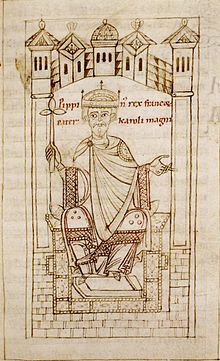
Back Pepyn die Korte Afrikaans Pippin der Jüngere ALS Pepín o Petit AN Pippen III Francena Cyning ANG بيبان القصير Arabic بيبين التالت ARZ Pépin (gazik ke Franca) AVK Gödək Pipin Azerbaijani پپن کهتر AZB Pepin the Shot BCL
This article needs additional citations for verification. (September 2022) |
| Pepin the Short | |
|---|---|
 Pepin the Younger, miniature, Anonymi chronica imperatorum, c. 1112–1114 | |
| King of the Franks | |
| Reign | 751 – 24 September 768 |
| Predecessor | Childeric III |
| Successor | Charlemagne |
| Mayor of the Palace of Neustria | |
| Reign | 741–751 |
| Predecessor | Charles Martel |
| Successor | Charlemagne |
| Mayor of the Palace of Austrasia | |
| Reign | 747–751 |
| Predecessor | Carloman |
| Successor | Merged into crown |
| Born | c. 714 |
| Died | 24 September 768 (aged 53–54) Saint-Denis, Kingdom of the Franks |
| Burial | |
| Spouse | Bertrada of Laon |
| Issue | Charlemagne Carloman I Gisela |
| Dynasty | Carolingian |
| Father | Charles Martel |
| Mother | Rotrude of Hesbaye |
| Religion | Chalcedonian Christianity |
| Signature | |
Pepin[a] the Short, Pippin III, Pepin the Younger (Latin: Pipinus; French: Pépin le Bref; c. 714 – 24 September 768), was King of the Franks from 751 until his death in 768. He was the first Carolingian to become king.[2]
Pepin was the son of the Frankish prince Charles Martel and his wife Rotrude. Pepin's upbringing was distinguished by the ecclesiastical education he had received from the Christian monks of the Abbey Church of St. Denis, near Paris. Succeeding his father as the Mayor of the Palace in 741, Pepin reigned over Francia jointly with his elder brother, Carloman. Pepin ruled in Neustria, Burgundy, and Provence, while his older brother Carloman established himself in Austrasia, Alemannia, and Thuringia. The brothers were active in suppressing revolts led by the Bavarians, Aquitanians, Saxons, and the Alemanni in the early years of their reign. In 743, they ended the Frankish Interregnum by choosing Childeric III, who was to be the last Merovingian monarch, as figurehead King of the Franks.[citation needed]
Being well disposed towards the Christian Church and Papacy on account of their ecclesiastical upbringing, Pepin and Carloman continued their father's work in supporting Saint Boniface in reforming the Frankish church and evangelizing the Saxons. After Carloman, an intensely pious man, retired to religious life in 747, Pepin became the sole ruler of the Franks. He suppressed a revolt led by his half-brother Grifo and succeeded in becoming the undisputed master of all Francia. Giving up pretense, Pepin then forced Childeric into a monastery and had himself proclaimed King of the Franks with the support of Pope Zachary in 751. Not all members of the Carolingian family supported the decision, and Pepin had to put down a revolt led by Carloman's son, Drogo,[citation needed] and again by Grifo.[citation needed]
As King of the Franks, Pepin embarked on an ambitious program to expand his power. He reformed the Franks' legislation and continued Boniface's ecclesiastical reforms. Pepin also intervened in favour of the Papacy of Stephen II against the Lombards in Italy. In the midsummer of 754, Stephen II anointed Pepin afresh,[3] together with his two sons, Charles and Carloman.[4] The ceremony took place in the Abbey Church of St. Denis, and the Pope formally forbade the Franks ever to elect as king anyone who was not of the sacred race of Pepin. He also bestowed upon Pepin and his sons the title of Patrician of Rome.[5] Pepin was able to secure several cities, which he then gave to the Pope as part of the Donation of Pepin. This formed the legal basis for the Papal States in the Middle Ages. The Byzantine Greeks, keen to make good relations with the growing power of the Frankish Empire, gave Pepin the title of Patricius.[citation needed]
In wars of expansion for the Frankish realm, Pepin conquered Septimania from the Umayyad and Andalusian Muslims and defeated them at the siege of Narbonne in 759,[6][7] and proceeded to subjugate the southern realms by repeatedly defeating Waiofar and his Gascon troops, after which the Gascon and Aquitanian lords saw no option but to pledge loyalty to the Franks. Pepin was, however, troubled by the relentless revolts of the Saxons and the Bavarians. He campaigned tirelessly in Germania as well, but the final subjugation of the Germanic tribes was left to his successors.[citation needed]
Pepin died in 768 from unknown causes and was succeeded by his sons Charlemagne and Carloman. Although Pepin was one of the most powerful and successful rulers of his time, his reign is largely overshadowed by that of his more famous son, Charlemagne.[citation needed]
- ^ Duckett 2022
- ^ Riché 1993, p. 65.
- ^ Doig 2008, p. 110
- ^ Duckett 2022
- ^ R.H.C 1957, p. 133
- ^ Deanesly, Margaret (2019). "The Later Merovingians". A History of Early Medieval Europe: From 476–911. Routledge Library Editions: The Medieval World (1st ed.). London and New York City: Routledge. pp. 244–245. ISBN 9780367184582.
- ^ Collins, Roger (1998). "Italy and Spain, 773–801". Charlemagne. Buffalo, London, and Toronto: Palgrave Macmillan/University of Toronto Press. pp. 65–66. doi:10.1007/978-1-349-26924-2_4. ISBN 978-1-349-26924-2.
Cite error: There are <ref group=lower-alpha> tags or {{efn}} templates on this page, but the references will not show without a {{reflist|group=lower-alpha}} template or {{notelist}} template (see the help page).